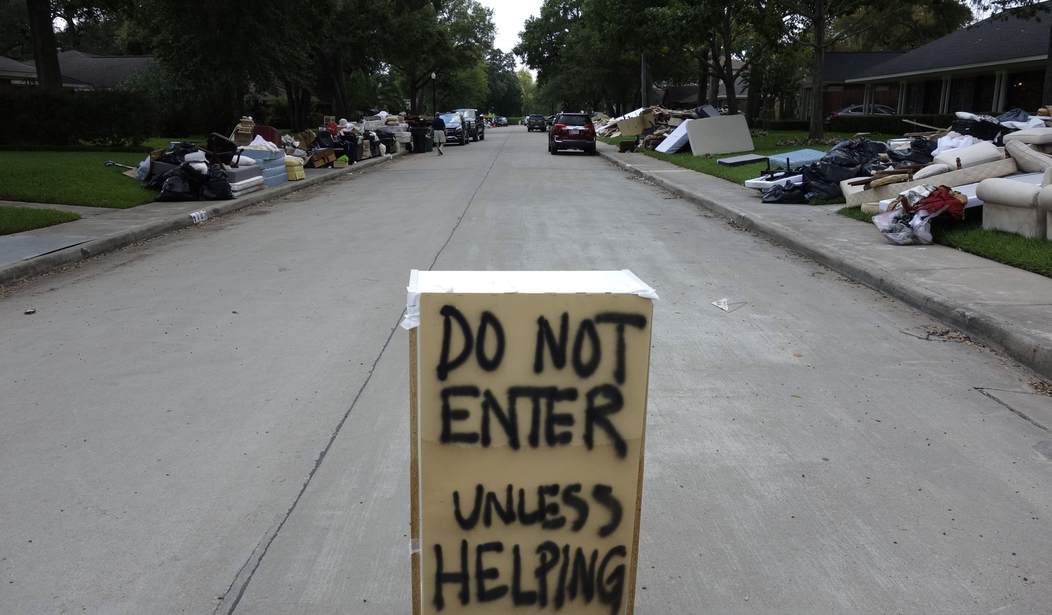Well, nyaaah, nyaaah, nyaaah! Out pops, in the general direction of small-government conservatives, the fastidious tongue of The New York Times itself. Just look at these small-government conservatives, the Times enjoins. Don't seem to care so much for "small government," do they, in Hurricane Harvey's aftermath!
"After Proudly Defying Washington," asserts the Times headline on Richard Fausset's story, "Hard-Hit Texas Needs Its Aid." And yes, the state may be entitled to it, the story implies, but not without a rap on the knuckles for disrespect toward the idea that the federal government can do something right.
Let us see whether we can disentangle a bit this narrative of the proud laid low and forced to grovel.
"There are few doubts that a Republican-dominated Congress will end up delivering aid to a battered state and key base of Republican power," Fausset writes. "But along with an outpouring of support, the process is raising eyebrows and drawing charges of hypocrisy."
Among New York and California Democrats? I shouldn't wonder. Liberals like to caricature fellow Americans who suggest that the power of the federal government is not without its limits. Sen. Ted Cruz comes in for especially persistent heckling. Cruz opposed a $50.5 billion relief package for Hurricane Sandy's Northeastern victims, arguing most of the money would go toward non-relief purposes. Now he's got his own hand out. Nyaaah, nyaaah, nyaaah! Take that, Ted!
We need to move as speedily as possible past the vantage point from which Texas' junior senator surveys life. Some of us can't always tell whether Cruz is surveying life or his own face and prospects. The larger point is the rightful role of the federal government in our affairs: which role we know to be vastly larger than the founders ever envisioned. Medicaid? Did it ever cross James Madison's mind, or John Dickinson's?
Recommended
At the root of our understandings about government's role is that of the general good -- not the good of this group or that one but the general good. We can argue and dispute all we like about the meaning of "general." You could argue, and get by with it, that a healthy citizenry being in the general interest, Medicaid qualifies for support. That argument at the same time leaves room for discussion of the questions: "Medicaid at what cost? To whom? With what attendant obligations?"
It is hard to imagine the most embittered modern Jeffersonian arguing against the concept of general government aid to disaster victims, wherever they live, under whatever political party's aegis. The general -- usually known today as the federal -- government was formed in 1787 in reaction to the individualistic chaos of the Articles of Confederation.
The Articles made cooperation among states hideously hard. The idea in 1787 was to make it easier. That the general government -- with undue enthusiasm, we might say -- steps into pastures from which it was originally barred is a historical fact. It hardly lessens the obligation to pay intelligent interest to new questions that arise constantly.
The first question that arises concerning aid to Harvey's victims is not whether Ted Cruz blew it by voting against aid to the Northeast, not at all. The first question is whether the general government has an interest in the succor and the comeback of an afflicted region unable to pay all the immediate freight for that mission. And second, does the general government, in the role of rescuer, pose a threat to the constitutional liberties of the American people, including the people of Texas?
I think on balance we must answer yes to the first question, no to the second. The technically minded, the purists, who worry about fine points rather than more sweeping considerations, may differ. Which is fine. We can discuss. We iron out the fine points through negotiation and conciliation.
A lot less fine and considerably less useful is the recapitulation of Sen. Cruz's voting record with respect to disaster aid, and the making of nose-thumbing points (yes, we see you, Mr. Fausett) to the discomfiture of important conservative principles, such as local rights and responsibilities. It seems a kind of intended payback to a state that voted for Donald Trump, even if Houston didn't.
Spare us, we could justly respond, the bookshelf of civic lessons meant less for others' relief than for enabling the teachers' smirks of joy.

























Join the conversation as a VIP Member